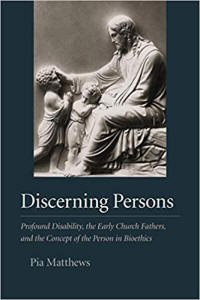Catholic Medical Quarterly Volune 70(4) November 2020
Book Review
Discerning Persons:
Profound Disability, the Early Church Fathers,
and the Concept of the Person in Bioethics
By Pia Matthews Published Franciscan University Press
Reviewed by Dr Pravin Thavasathan
 What
is a person? That is the central question in this very helpful work. By
recourse to the Early Church Fathers, Pia Matthews demonstrates that from
the very beginning of Christianity it was argued that all human beings,
whatever their mental capacity, share in the dignity of being persons
destined for friendship with God. By becoming Incarnate, God raised
humanity to a dignity beyond compare. We are all destined to supernatural
friendship with God.
What
is a person? That is the central question in this very helpful work. By
recourse to the Early Church Fathers, Pia Matthews demonstrates that from
the very beginning of Christianity it was argued that all human beings,
whatever their mental capacity, share in the dignity of being persons
destined for friendship with God. By becoming Incarnate, God raised
humanity to a dignity beyond compare. We are all destined to supernatural
friendship with God.
While I found the entire work of interest, I will focus on the first few chapters, as they are especially relevant to bioethics.
What is a person? The utilitarian philosopher Peter Singer famously said that new born infants are not persons and are not deserving of the rights granted to human persons. Hence his moral justification of infanticide. He is hardly a lone voice: his mentor, Jonathan Glover, also sought to differentiate between human beings and persons. Joseph Fletcher held the view that persons are autonomous individuals and people with severe cognitive disabilities are therefore non-persons. John Harris follows Locke and many later philosophers in believing that persons are individuals who have to have the capacity to value their own existence. If "creatures" that cannot value their own existence are killed, it cannot be wrong because "their death deprives them of nothing". Harris proceeds to make the logical and ghastly next step: abortion and even infanticide on disability grounds are legitimate means of combating disability! The kindest thing to do for the disabled is to get rid of them in early life. At least, Harris appears to acknowledge that abortion on disability grounds leads to a society that does not value disabled lives.
James Rachels, another ethicist widely quoted in the literature, argues that the death of the "mentally defective" human being is less tragic than that of "normal" human beings. Beauchamp and Childress also have a utilitarian understanding of medical ethics. Among their four principles, justice appears to mean mere distributive justice concerned with resource allocation. Autonomy is understood in libertarian terms of non-interference. The non-competent is not entitled to autonomy owing to lacking in capacity. But are they not entitled to the other two principles of beneficence and non-maleficence? Yes, but utilitarians can still argue that killing the disabled is morally permissible provided it is done painlessly.
Singer argues that the definition of Boethius, that a person is an individual substance of a rational nature, fits in with his own views. But, as Matthews shows, Boethius stands in the patristic theological tradition of supporting the full status of personhood for all humans.
We might have expected theologians to have a different perspective to the utilitarians. Not in all cases. Nigel Biggar believes that patients in a persistent vegetative state exist merely in biological life because they can no longer respond to their God-given vocation. Biggar has been appointed a member of the Pontifical Academy for Life. Tristram Engelhardt, the ex-Catholic who joined the Orthodox Church, believes that seriously deformed infants may be regarded as "monstrosities" and no longer to be regarded as a gift of God. Both Biggar and Engelhardt have departed from the consistent patristic tradition.
In this book, Matthews has clearly shown that the Christian tradition never attempted to differentiate between human persons and beings.
